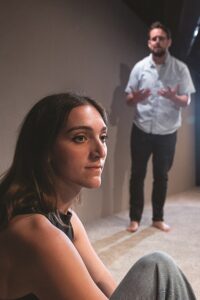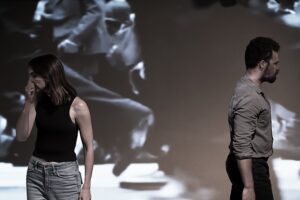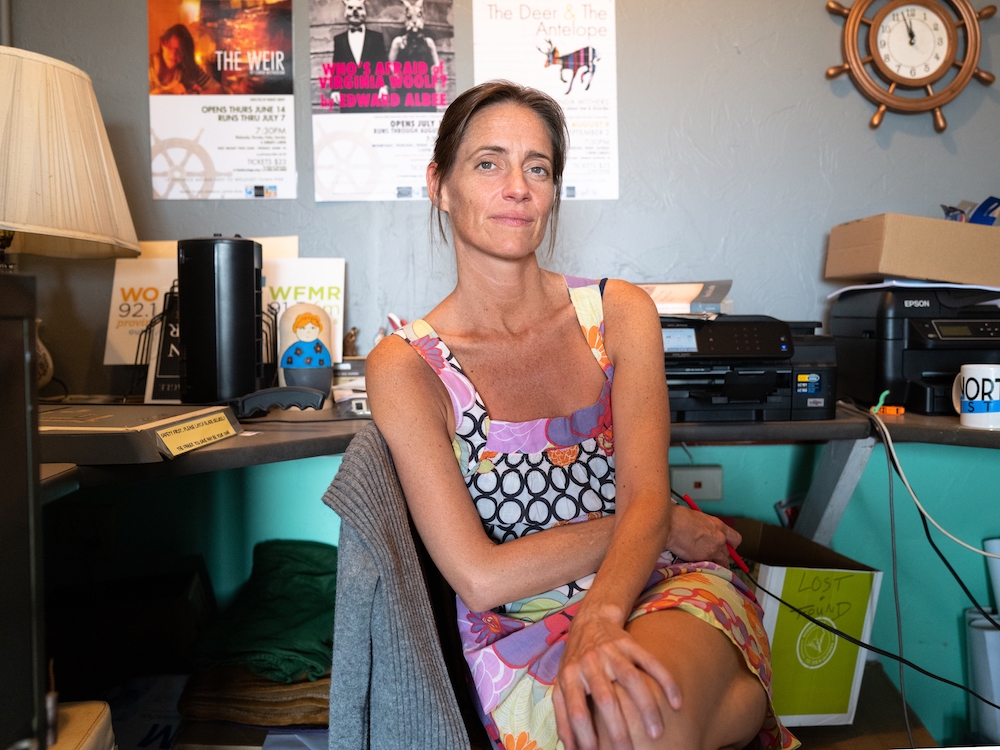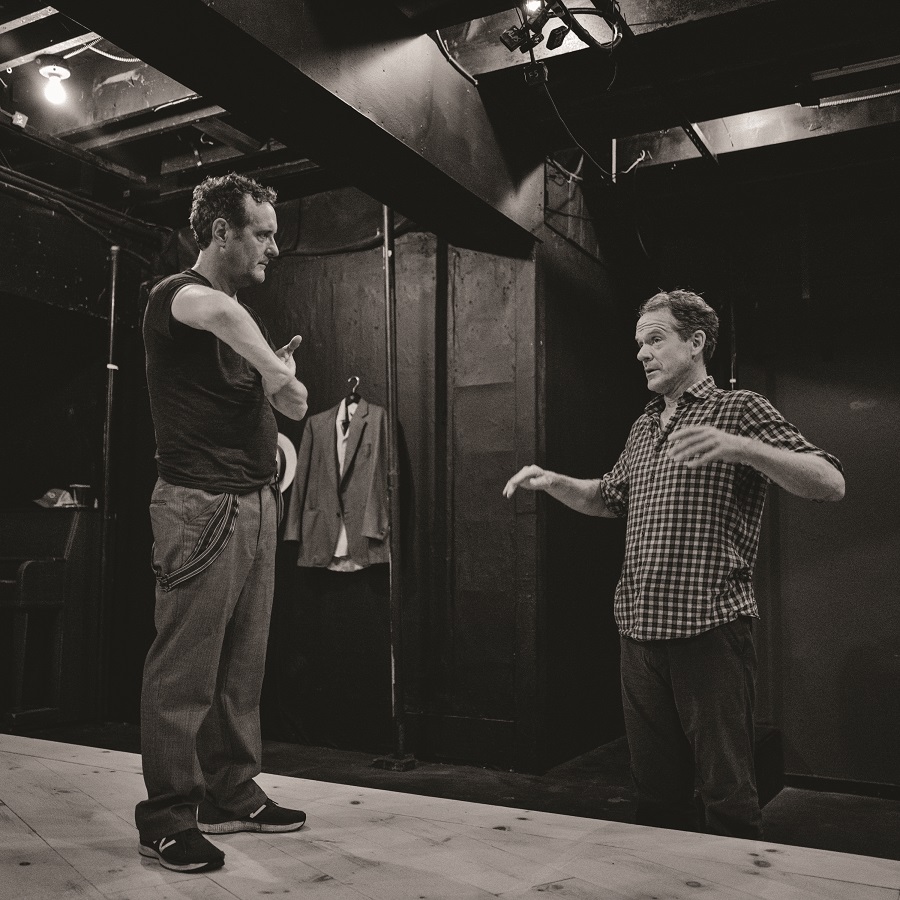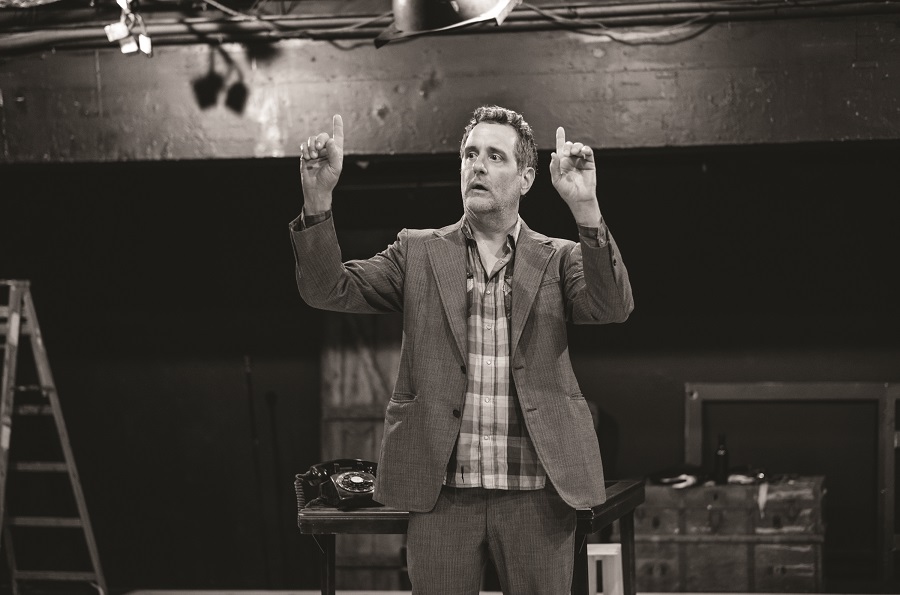Back when their thumbs up or down held some sway over box office sales, movie critics Gene Siskel and Roger Ebert both named 1981’s My Dinner With Andre among the top five movies of the 1980s.
The title sums up the plot: in the film, co-stars and co-writers Wallace Shawn and Andre Gregory talk over dinner at a New York City restaurant. They discuss theater, careers, death, spirituality, omens, fascism, the decline of Western civilization. With characters sharing names and many experiences, Shawn and Gregory seemed to play slightly fictionalized versions of themselves but later denied that in interviews.
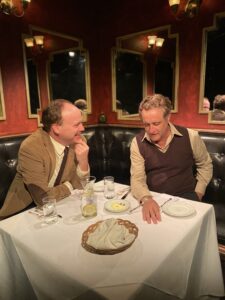
While it has been parodied multiple times, the art house hit directed by Louis Malle is revered by many, including Robert Kropf and Jonathan Fielding, co-founders of Wellfleet’s Harbor Stage Company.
Fielding considers My Dinner With Andre one of the best films ever made about theater, and he believes it is accessible to any viewer because of the duo’s broad philosophical conversation about the choices we make.
That passion inspired Fielding to buy a copy of the original screenplay and reignite a conversation among Harbor Stage artists about what a great play that movie could become — with him as Wally and artistic director Robert Kropf as Andre. They applied for the rights to adapt and stage a live production of the story.
Months passed. Then they suddenly got a “yes” email from Wallace Shawn himself, now 80, saying Harbor Stage could be the first U.S. company to adapt the text for the stage. Shawn’s response read in part: “No one has done the movie as a play in the U.S. before, because it seemed weird to us and we always said no, but now, it’s the least weird thing happening in our country.” (As of opening weekend, they’d had no word from Gregory, who moved to Truro two decades ago.)
It seems like a natural extension: the film feels like a play in its lack of action and expansive ideas. Plus, its creators were primarily involved in theater. Harbor Stage’s My Dinner With Andre adaptation, though, isn’t an exact re-creation. It’s a 90-minute, one-act version of the 110-minute film that adds some material cut from the original three-hour screenplay.
The result, which has no director listed, works well. And in some ways, watching this conversation live — with these two engaging actors — is an improvement on the original. It will leave you thinking about your own life choices and compromises.
What is Wally’s voiceover in the movie starts before the lights go down, as Fielding quietly stands next to the audience and begins talking about life as a struggling playwright. He confesses he’s been avoiding Andre because of what he’d heard about his emotional state.
Wally then reluctantly meets Andre. They are seated in Evan Farley’s realistic set: a leather banquette dining table backed by dark paneling, rich red wallpaper, and a few paintings. Four large wall mirrors become integral to watching facial expressions even when the actors are looking at each other.
All the talk between these two upper-class, self-centered men takes place in that booth until they head home. While recorded sounds initially indicate other diners, they fade. The only other character is Robin Bloodworth’s polite waiter, occasionally visiting, serving and removing food. He’s deferential to Andre, and sometimes glances quizzically at Wally.
Andre does most of the talking. He reminisces about international attempts to seek enlightenment and to feel more alive. Kropf is an animated storyteller, his eyes and eyebrows constantly expressive, his speech often coming rapid-fire, hands and arms waving, legs restless. It’s a style that — compared to Gregory and Malle’s frequent close-ups — feels more accessible and sometimes more humorous than the film.
Being able to constantly watch Fielding’s reactions — rather than having occasional cuts to Wally in the film — also adds comedy and depth. Fielding uses body language, furrowed brows, and trying-to-be-patient expressions to indicate his skepticism and attempts to understand, sometimes pushing into a “What the heck are you talking about?” stare that gets laughs.
His sympathetically uncertain Wally — who eats much of a real meal — grasps at moments when mindsets meet but finally explodes with his more practical and reality-based perspective. Where is the line between purposefulness and just being? Why can’t it be just as important to appreciate small things that make you happy — people you love, an electric blanket, coffee, a book — rather than traveling solo to the ends of the Earth to try to feel alive?
This adaptation is so seamless that it’s hard for a casual viewer to tell what was cut from the movie or added from the original screenplay. Key dialogue like Wally’s counterargument — or Andre’s bizarre “beehive” event in Poland, where he was nearly buried alive, and his chilling query about whether keeping people bored could be totalitarian brainwashing to create sleeping people who won’t say no — are intact and still have power.
Harbor artists also wanted to offer this play in the 2024 political climate, according to Fielding, because it shows two people with different viewpoints talking and disagreeing, civilly, trying to understand the other, and remaining friends. One of so many ideas worth considering here, making the Harbor’s Andre a dinner date worth saying yes to.
Dinner Chatter
The event: My Dinner With Andre, adapted for the stage
The time: Through Aug. 3, Thursdays-Saturdays and Wednesday, July 31 at 7 p.m.; Sundays at 5 p.m.
The place: Harbor Stage Company, 15 Kendrick Ave., Wellfleet
The cost: $25 at harborstage.org, 508-349-6800
